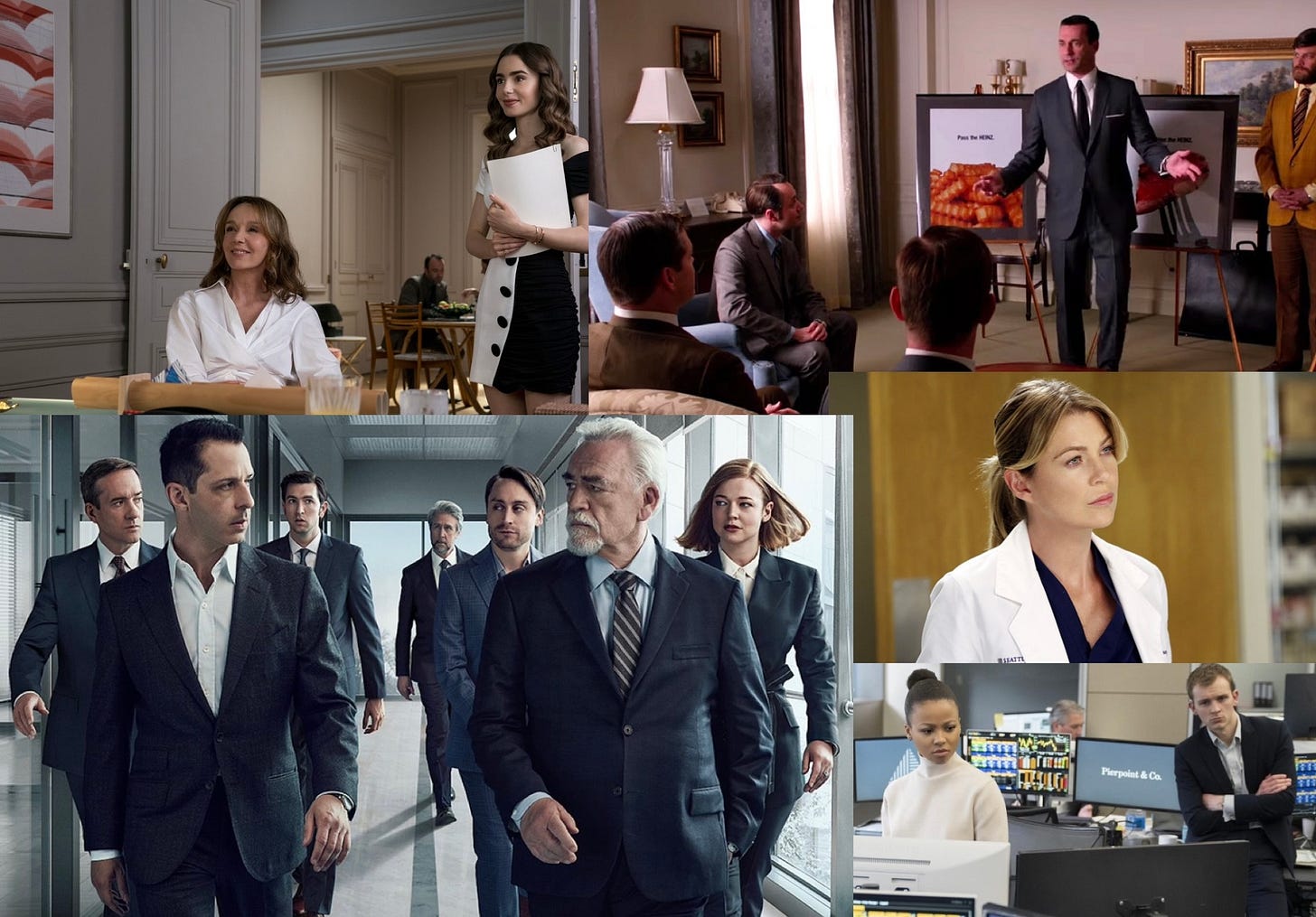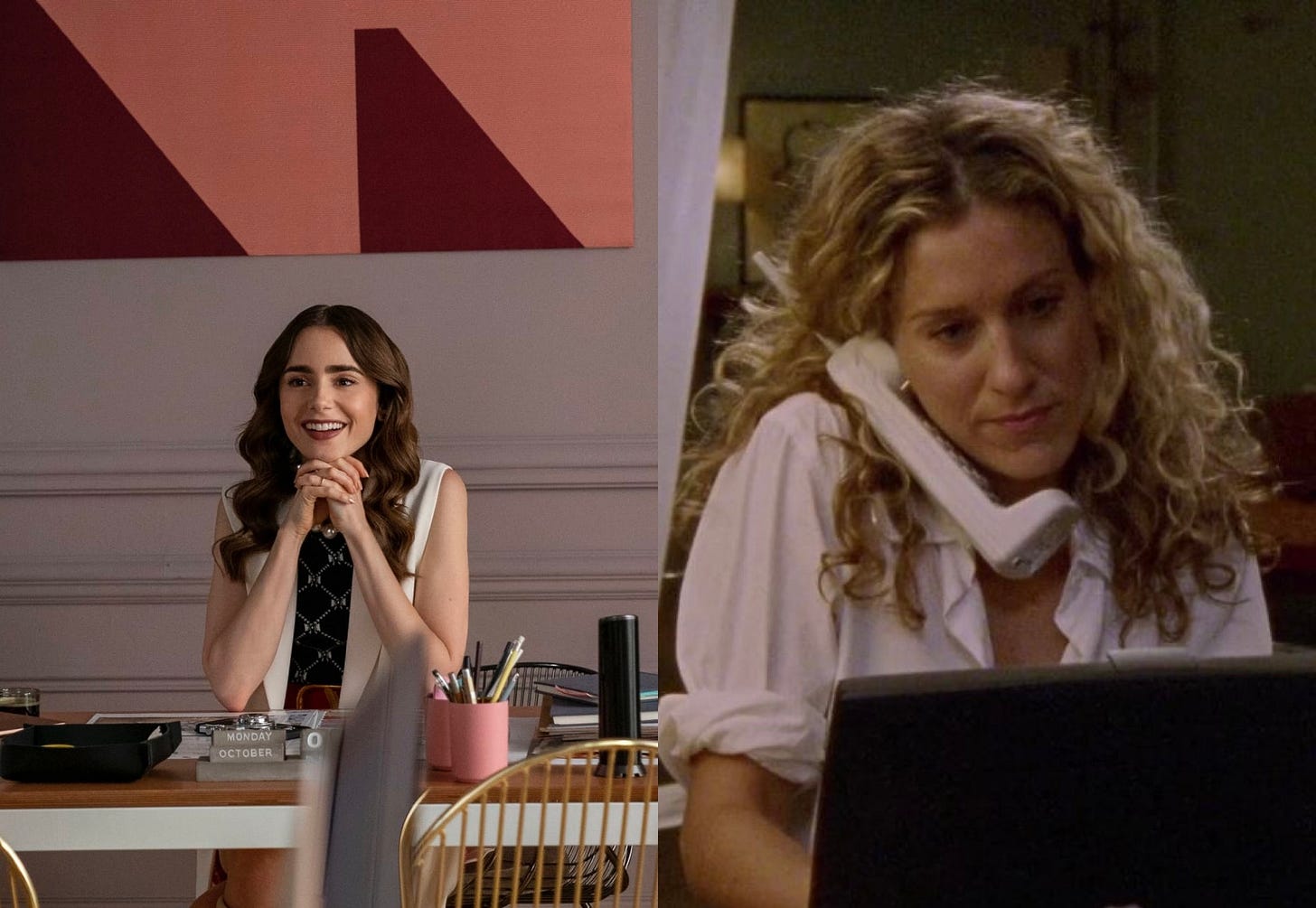Is it stupid to admit that I enjoyed my 9-5 most when Succession was on the air? To some extent, it’s a case of correlation over causation. Some confounding variables are at play, including when I started the job, post-graduation clarity, and so on. But still, the timing of the show’s final season premiering as I started my first properly grown-up media job was impeccable. In tandem with its moments of high stress and heavy jargon, Succession applied a thick layer of gloss to the Big Media world that made working with legacy media companies feel a bit sexier. Sure, I’m not the heir to a multi-billion dollar multimedia firm like the Roy children, but I’m working with people who know people who know people who might know those types of people. My strings of connection coming into sharper relief. I’m not just a girl watching Mad Men out of her college dorm anymore, no, I’m like the people on TV. Or, are they becoming more like me? Perhaps a bit of both.
Most people spend a good deal of their days - and consequentially, a good deal of their lives - working paid jobs. And in the United States, over a quarter of these people work for a company that has more than 2,500 employees - what the US Census considers a “large employer.” A 2018 US Census study shows that roughly 36% of employed workers work in management, office and administrative support, sales, and business and financial operations roles. Thus, it makes sense why media about work, and corporate life, specifically, has resonated with many American audiences. Before the twenty-first century, films like Wall Street (1987) found moderate critical and commercial success, but the turn of the millennium brought forth a slew of workplace shows that captured the public’s admiration in an unparalleled fashion.
Set in The White House amid a group of cutthroat presidential advisors, The West Wing, which premiered in 1999, got the ball rolling for popular workplace dramas of the early aughts and 2010s - earning twenty-six Primetime Emmys during its seven-year run. The West Wing proved there was an appetite for series set in high-stress workplaces such as hospitals (Grey’s Anatomy, ER, etc.), law firms and schools (Suits, How To Get Away With Murder, etc.), advertising firms on Madison Avenue (Mad Men), and the C-suite of a top media conglomerate (Succession). Alongside these acclaimed dramas, comic relief cut through the iciness via shows like The Office, Parks & Recreation, 30 Rock, and Veep, which made light of the tension that can fester in mundane and high-strain jobs alike. Today, HBO’s Industry - centered around Pierpoint, a fictional, London investment firm - has seduced the public, not using dragons, drug cartels, or any other kind of imaginary or adrenaline-ridden TV magic - but through harnessing what writer Brendon Holder calls a “propulsive anxiety” that is simultaneously faraway, and all too familiar.
For many, television acts as a kind of balm. Watching an episode of a series on a weeknight along with dinner or before you fall asleep acts as a kind of nightcap, softening the edges of a stressful workday by allowing you to traverse the life of a fictional person. According to writer Haaniyah Angus, settings like the frantic trading floor of Industry’s Pierpoint are like a kind of modern fantasy, as chaotic as they seem. The days of dwelling inside the mind of a happy-go-lucky character who somehow bypasses the cruel realities of modern work life (i.e. Carrie Bradshaw’s $4/word rate at Vogue) are bygone. Networks have tried out new versions of the glamorous, Sex and the City-style television fantasy in modern shows like Emily In Paris and have seen middling success, at least in terms of critical and cultural reception. Emily In Paris is a hate-watch or a joke-watch to many - it’s as if viewers are tired of trying to delude themselves and want to instead stare their open wounds right in the eye.
The exaggerated, jittery, heart-thumping nature of modern workplace shows like Succession and Industry - accompanied by lawless cinematography choices and synth-heavy scores - reflect the real-world strains that high-stress workers experience. Seeing these anxieties reflected and hyperbolized on TV allows viewers to feel seen in a way that feels validating and even elevated. The protagonists in these types of shows are often placed in high-stakes scenarios that feature lofty rewards and even loftier risks. Amid a corporate landscape in which many feel increasingly numbed and alienated by their day-to-day work, seeing corporate jobs performed in this exalted - almost Shakespearean, in Succession’s case - manner makes the work suddenly feel important, or at the very least, evocative. Often having their minds stupefied staring at computers and nodding on Zoom calls, elevated corporate dramas offer viewers the promise of feeling. A promise that can perhaps be projected onto one’s day-to-day.
In addition, and a bit conversely, Angus suggests that workplace shows offer non-corporate workers the opportunity to bask in the fantasy of stability. While the main characters of shows like Succession and Industry work egregious hours and often turn to drugs and alcohol to turn their energy up and down, they undoubtedly also have work benefits and privileges that the average gig worker lacks. “We live in this culture of zero-hour contracts, so to have a set amount of hours and a regular salary feels like a privilege,” an Industry fan and writer tells Angus for A Rabbit’s Foot. This more pragmatic longing for reliable work and pay - even at the cost of your personhood - may also be what’s led writers and viewers away from the more fantastical Sex and the City- and Emily in Paris-esque storylines.
Further, corporate workplaces have become some of the most accessible and emblematic settings for stories about dynasty, ascension, and betrayal. Whether we want it to or not, paid work stains our personal lives in ways we can’t always control. Our relationships, how we choose to manage our time and goals, where we live, how we perceive ourselves - all of it is affected by how we choose to make money, in one way or another. Young students are encouraged to pursue full-time jobs that fulfill their passions, indirectly learning that a path toward career fulfillment is a path toward personal fulfillment. This pursuit of personal fulfillment must, of course, be accompanied by a quest towards financial independence and living free of debt. And so, young people embark on a kind of Hero’s Journey upon graduating, juggling these weighty, and often contradictory, goals. All the while, corporations - with their promises of security and personal growth - loom like omnipotent, beckoning gods. They are hands that often feed generously - or at least, appear to. But like all fables involving personal ascension and conquest, there is usually some kind of sacrifice involved, whether it’s your time, your mental well-being, your personal satisfaction and morals, or even your personal relationships.
Work is a great equalizer - a common denominator. When working, people experience the full spectrum of human emotion - work is a source of gratification, defeat, and boredom. It makes sense then why the corporate workplace - idealized, cumbersome, and made to appear frictionless - is the perfect backdrop upon which to place a breadth of complex storylines. The corporate workplace evokes a particular feeling in young viewers, be it excitement, anxiety, jealousy, or contempt. And that evocation is the kindling upon which a compelling plot line and a slew of interesting characters can ignite a satisfying spark.







i think what's also interesting is the role that these kinds of tv shows play in the romanticisation of work for uni/college students. in a world where everything has a correlating 'aesthetic' or '-core', it's not surprising that students / young adults are turning to dramatic and glamorised renditions of the future life that they are working towards for motivation. if it wasn't possible to romanticise it, it wouldn't fit in with the gen z way of life !! this was a really interesting article :)
As someone who is probably going to be working an office job when I graduate from university and is currently watching the last episode of Industry, shows like this help me see the 9-5 office life as less depressing than we've always been told, even if it's dramatized and a little unrealistic. Also, unrelated to work drama, but the 'office siren' core and FKA twigs' upcoming album Eusexua tap into the aesthetics of office life.